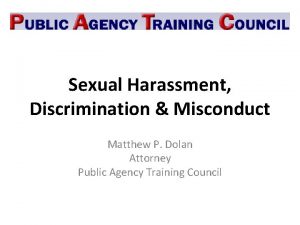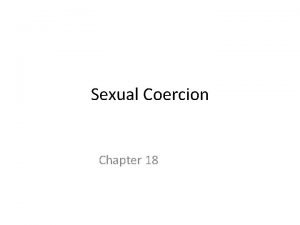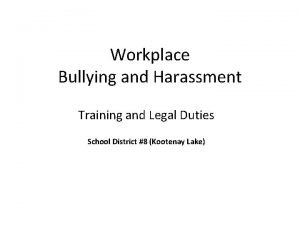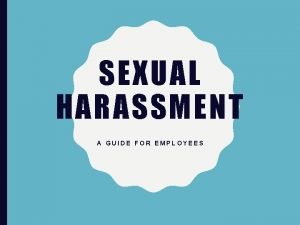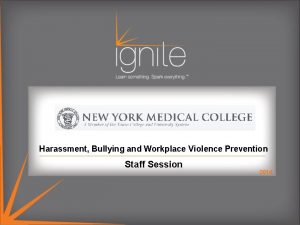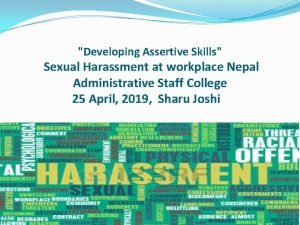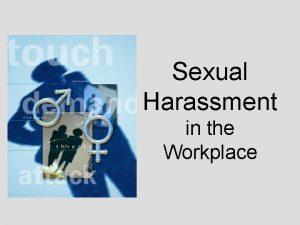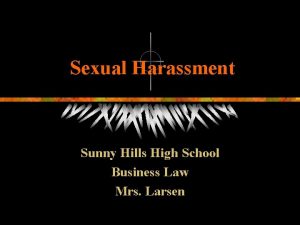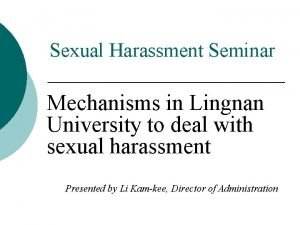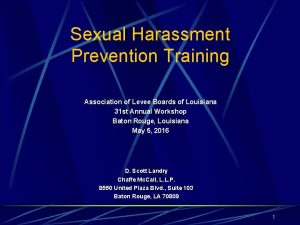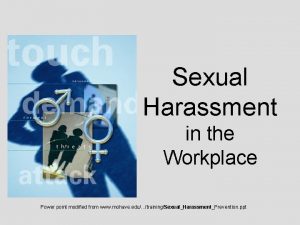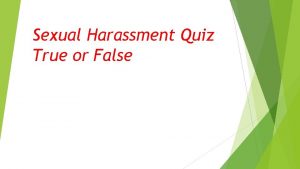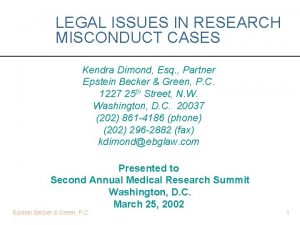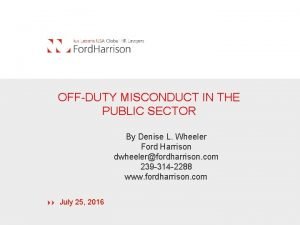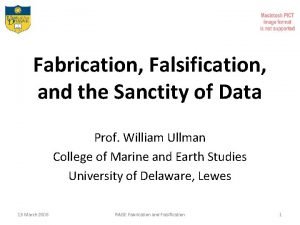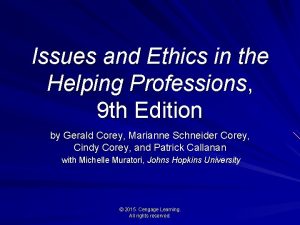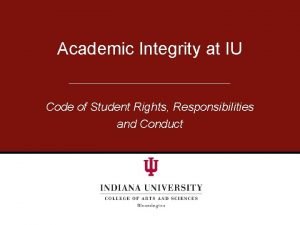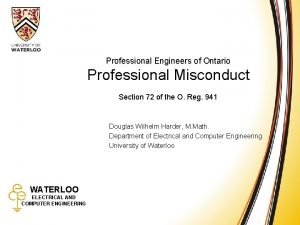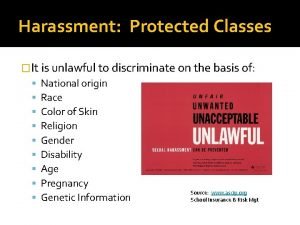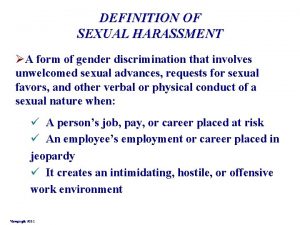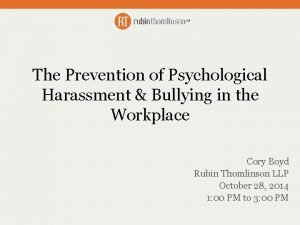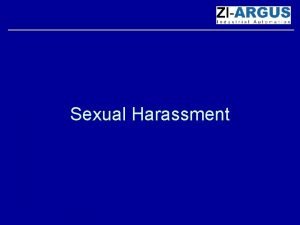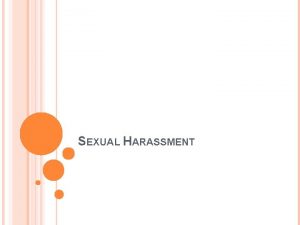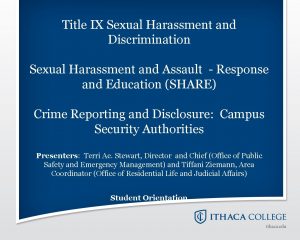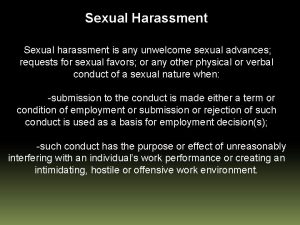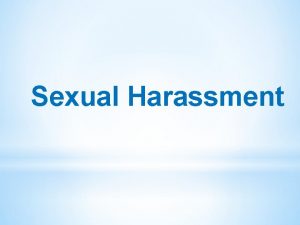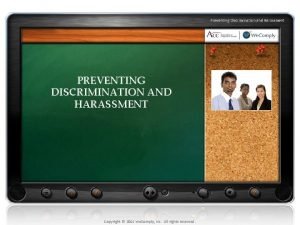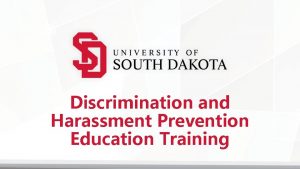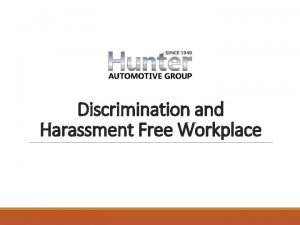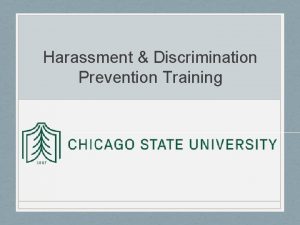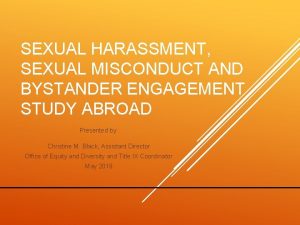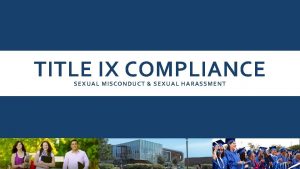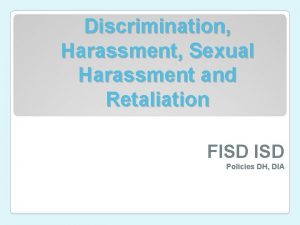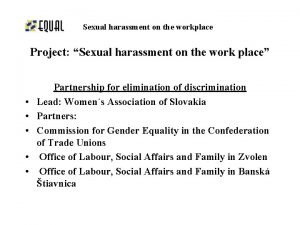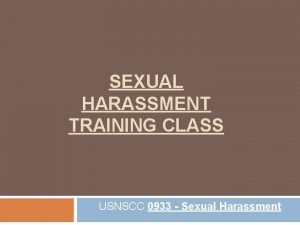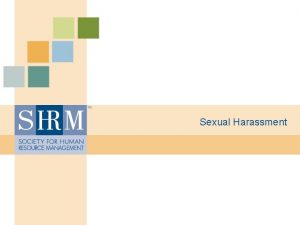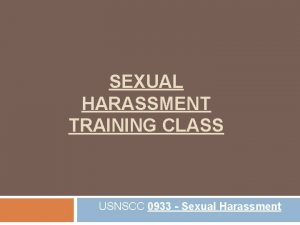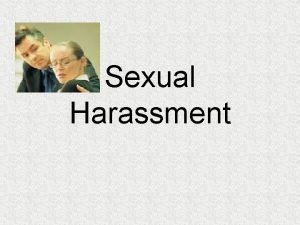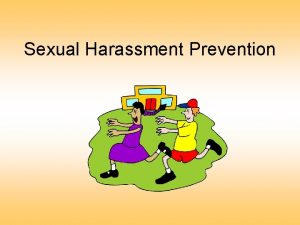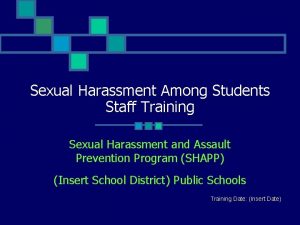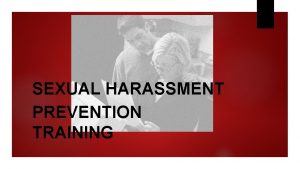Sexual Harassment Discrimination Misconduct Matthew P Dolan Attorney




















![Alvarado v. Tex. Rangers (Cont’d) • 5 th Circuit notes that [P’s] score sheets Alvarado v. Tex. Rangers (Cont’d) • 5 th Circuit notes that [P’s] score sheets](https://slidetodoc.com/presentation_image_h/bbbd1ef305861be9c0ff09469dc12555/image-21.jpg)











- Slides: 32

Sexual Harassment, Discrimination & Misconduct Matthew P. Dolan Attorney Public Agency Training Council

Summary Judgment • Standard: Summary judgment is appropriate if the record shows that there is “no genuine issue as to any material fact and [that] the movant is entitled to judgment as a matter of law. ” Fed. R. Civ. P. 56(a). • Without compelling documentation, conflicting stories go to the finder of fact. • If it’s not in writing, it didn’t happen.

Title VII of the Civil Rights Act of 1964 • Prohibits discrimination, with respect to “terms, conditions or privileges of employment, ” based on: – Race, – Color, – Religion, – Sex, and – National origin.

What is a Tangible Employment Action? Hiring, Failing to promote, Reassignment with significantly different responsibilities, or • A decision causing a significant change in benefits • • See Burlington Indus. , Inc. v. Ellerth, 524 U. S. 742 (1998) • Harassment Title VII is not limited to economic or tangible discrimination See Meritor Savings Bank, FSB v. Vinson 477 U. S. 57 (1986)

Sexual Harassment in the Workplace • Quid Pro Quo: An employee is required to choose between submitting to sexual advances or losing a tangible job benefit. • Hostile Work Environment: Unwelcome sexual conduct unreasonably interferes with an individual’s job performance or creates a hostile, intimidating, or offensive work environment. See Meritor Savings Bank, FSB v. Vinson 477 U. S. 57 (1986)

Quid Pro Quo Harassment • Essential that harasser had power to control the employee’s employment benefits, most often occurring between supervisor and subordinate. • No requirement that these requests be express demands for sexual favors. (May be implied by the circumstances and actions. ) • Acquiescence or even voluntary participation in sexual activity does not mean the advances were welcomed. See Meritor Savings Bank, FSB v. Vinson 477 U. S. 57 (1986)

Foster v. Ohio Bell Tel. Co. • Male P alleging sexual harassment by female manager. • Female manager made unwanted sexual advances towards P, and later interviewed him for a promotion. • Court: “We find an issue of fact exists as to whethere is a causal nexus between [P's] refusal of [manager's] alleged advances and his failure to be offered the sales coach position. Construing the evidence most strongly in [P's] favor, a jury could reasonably conclude that [P] was subjected to quid pro quo sexual harassment. ” • D’s Motion for SJ re: quid pro quo sexual harassment denied. See Foster v. Ohio Bell Tel. Co. , 2009 Ohio 6465 (Ohio Ct. App. , Cuyahoga County 2009)

Defining Hostile Work Environment Sexual Harassment Supreme Court has established that actionable sex-based harassment must be shown to be: (a) severe or pervasive (b) created a hostile or abusive working environment (c) was unwelcome; and (d) was based on the plaintiff’s sex. See Meritor Savings Bank, FSB v. Vinson 477 U. S. 57 (1986)

Sexual Harassment Misperceptions • Sexual Harassment is NOT limited to sexual advances. • Sexual Harassment = Gender-based Harassment

Minimizing Employer Liability in Hostile Work Environment Cases • IF there was harassment that was accompanied by a tangible employment action = employer is liable. • IF not, employer avoids liability by showing: (1) that it exercised reasonable care to prevent and correct promptly any sexually harassing behavior, and (2) that Plaintiff unreasonably failed to take advantage of any preventive or corrective opportunities provided by her employer. See Burlington Industries, Inc. v. Ellerth, 524 U. S. 742 (1998); See Faragher v. City of Boca Raton, 524 U. S. 775 (1998)

Supervisor Harassment versus Co-Worker Harassment Courts treat comments and actions of supervisors more seriously than similar comments and actions made by co-workers. See Steck v. Francis, 365 F. Supp. 2 d 951 (N. D. Iowa 2005)

Steck v. Francis • P police officer filed claim for hostile work environment sexual harassment in violation of Title VII, based on comments made by the Chief of Police. • Court: “if the harasser's status as either a co-worker or supervisor is irrelevant to the determination of whether the environment was objectively hostile, then a reasonable jury probably could not find that [Plaintiff’s] claim involved an "objectively hostile" environment. • Court: “Where the harasser is a supervisor, the impact of the harassment is heightened: Harassment by a supervisor appears to carry the weight…of the employer's authority and seems to authorize or condone like conduct by subordinates, thereby fostering a perception that the environment as a whole is hostile. ” • D City’s Motion for Summary Judgment Denied. See Steck v. Francis, 365 F. Supp. 2 d 951 (N. D. Iowa 2005)

Courts’ Requirements of Employers re: Sexual Harassment • Reasonable Care to Prevent Harassment (Formulating and Effectively Communicating Policy) • Reasonable Care to Correct Harassment (Following the Policy) See Burlington Industries, Inc. v. Ellerth, 524 U. S. 742 (1998); See Faragher v. City of Boca Raton, 524 U. S. 775 (1998)

Effective Harassment Policies • Enhancing organizational integrity. • Protecting the organization from the organizational stress, financial hardship and loss of public trust that comes with exposure to legal liability.

Key Harassment Policy Components (1) Definition of, and stated opposition to, unlawful harassment; (2) Guidelines for reporting harassment; and (3) Clear communication that retaliation for reports of harassment will not be tolerated

Employee Duty to Report Harassment • P has a duty to take advantage of multiple avenues for reporting harassment to trigger employer liability. • Sexual Harassment Policies should specify how to report and, whenever possible, offer multiple avenues to report. See Shaw v. Auto. Zone, Inc. , 180 F. 3 d 806 (7 th Cir. 1999); See Roelen v. Akron Beacon Journal, 199 F. Supp. 2 d 685 (N. D. Ohio 2002)

Fraternization and Sexual Harassment • “The fact that an employee had previously engaged in a consensual sexual relationship with a supervisor is not an affirmative defense to a claim of sexual harassment under…Title VII. ” See Monaghan v. El Dorado County Water Agency, 2011 U. S. Dist. LEXIS 114981 (E. D. Cal. 2011) • “A person's private and consensual sexual activities do not constitute a waiver of his or her legal protections against unwelcome and unsolicited sexual harassment. " See Winsor v. Hinckley Dodge, 79 F. 3 d 996 (10 th Cir. 1996) • “Whether a harasser picks his or her targets because of a prior intimate relationship, desire for a future intimate relationship, or any other factor that draws the harasser's attention should not be the focus of the Title VII analysis. ” See Forrest v. Brinker Int'l Payroll Co. , LP, 511 F. 3 d 225 (1 st Cir. 2007)

Sexual Discrimination

Elements of Proof— Sexual Discrimination • “A Title VII plaintiff can satisfy her burden of proof by two avenues: (1) she may present direct evidence of discriminatory intent or, because of the difficulty in directly proving discrimination, (2) she may use the indirect, burden-shifting procedure set forth in Mc. Donnell Douglas. ” See Hildebrandt v. Ill. Dep't of Natural Res. , 347 F. 3 d 1014 (7 th Cir. 2003) • “Under the indirect method…In order to establish a prima facie case for gender discrimination, the plaintiff must demonstrate that: (1) she is a member of a protected class; (2) she was performing her job to her employer's legitimate expectations; (3) that in spite of her meeting the legitimate expectations of her employer, she suffered an adverse employment action; and (4) that she was treated less favorably than similarly situated male employees. ” See Hildebrandt v. Ill. Dep't of Natural Res. , 347 F. 3 d 1014 (7 th Cir. 2003)

Alvarado v. Tex. Rangers • Female applicant denied promotion in favor of male applicants. • D attempted to justify its decision not to hire P by noting that the scores she received from a panel assessing her interview performance were lower than the scores received by the applicants hired. • 5 th Circuit rejected this basis as inadequate because the D offered neither an explanation of the scores nor evidence of how or why the interviewers arrived at the scores. • 5 th Circuit: Without some indication of the factual basis or specific reasons for the P’s interview score, “the score [said] nothing about whether nonselection for the Rangers was the product of sex discrimination. ” See Alvarado v. Tex. Rangers, 492 F. 3 d 605 (5 th Cir. 2007)
![Alvarado v Tex Rangers Contd 5 th Circuit notes that Ps score sheets Alvarado v. Tex. Rangers (Cont’d) • 5 th Circuit notes that [P’s] score sheets](https://slidetodoc.com/presentation_image_h/bbbd1ef305861be9c0ff09469dc12555/image-21.jpg)
Alvarado v. Tex. Rangers (Cont’d) • 5 th Circuit notes that [P’s] score sheets contain no notes or comments on her interview performance”. • D failed to document rationale with any specificity. • 5 th Circuit: “[a]n employer's subjective reason for not selecting a candidate, such as a subjective assessment of the candidate's performance in an interview, may serve as a legitimate, nondiscriminatory reason for the candidate's non-selection. ” But “[s]uch a reason will satisfy the employer's burden of production. . . only if the employer articulates a clear and reasonably specific basis for its subjective assessment. ” • D’s Motion for Summary Judgment Denied.

The Appearance of Discrimination Absent documentation of factors unrelated to gender—performance issues, misconduct issues, etc. —negative employment actions tend to have the appearance of discriminatory motive.

Reasonable Policies Must be Consistently Applied • In work-rule violation cases, a prima facie case and pretext can be established by showing that, even though the employee did violate, employees who engaged in similar acts were not punished similarly. • Applies to varying levels of importance.

Sexual Misconduct

Establishing a Clear Policy The frequency of sexual misconduct in public safety warrants policies to clarify: – what is sexual misconduct, and – what are the consequences of engaging in it/becoming aware of it and failing to report accordingly.

Defined Sexual Misconduct: Any sexual activity while onduty or stemming from official duty. Sexual misconduct includes but is not limited to use of official position and official resources to obtain information for purposes of pursuing sexual conduct.

Discipline Established by Agency Policy • Any officer found to be in violation of the provisions of this policy shall be disciplined up to and including termination and criminal charges where established. • Any employee having knowledge of a violation of this policy, who fails to report said violation shall also be disciplined up to and including dismissal, and criminal charges if appropriate. • If the violation involves supervisory personnel, the reporting officer will notify the appropriate command level officer and will not be strictly held to his or her chain of command.

Sexual Misconduct and Early Warning Systems Regular audit and inspection techniques – Auditing dash cameras – Auditing the characteristics of individuals being stopped by a particular officer – Investigating complaints with an eye to potential patterns of behavior

Disclaimer Court holdings can vary significantly between jurisdictions. As such, it is advisable to seek the advice of a local prosecutor or legal advisor regarding questions on specific cases. This presentation is not intended to constitute legal advice on a specific case. Rather it is for informational purposes.

Thank You! Matthew P. Dolan Attorney Public Agency Training Council 800 -365 -0119 mdolan@patc. com

Upcoming In-Class Training Supervisor Liability La Vista, NE 8/26/2014— 8/27/2014 Crowley, TX 9/16/2014— 9/17/2014 Las Vegas, NV 9/23/2014— 9/24/2014 Supervising the Toxic Officer New Brunswick, NJ 9/3/2014— 9/4/2014 Biloxi, MS 9/30/2014— 10/1/2014 http: //www. patc. com/training/schedule. php

 Matthew dolan attorney
Matthew dolan attorney Sexual misconduct meaning
Sexual misconduct meaning Sexual harassment definition
Sexual harassment definition Objective of sexual harassment
Objective of sexual harassment Sexual harassment definition
Sexual harassment definition Sexual harassment at workplace act nepal
Sexual harassment at workplace act nepal Sexual harassment cases in correctional centres
Sexual harassment cases in correctional centres Boku no sexual harassment manga
Boku no sexual harassment manga Examples of harassment
Examples of harassment Sexual harassment poster
Sexual harassment poster Sexual harassment seminar
Sexual harassment seminar Wsu sexual harassment training
Wsu sexual harassment training Louisiana sexual harassment training
Louisiana sexual harassment training Sexual harassment definition
Sexual harassment definition Sexual harassment training quiz
Sexual harassment training quiz Dolan school of business
Dolan school of business Cushing and dolan fees
Cushing and dolan fees Psychologie du travail et des organisations dolan
Psychologie du travail et des organisations dolan Melanie battaglia
Melanie battaglia Dolan hall fairfield university
Dolan hall fairfield university Cushing dolan
Cushing dolan Yvonne dolan
Yvonne dolan Fabrication research misconduct
Fabrication research misconduct Ori research misconduct
Ori research misconduct Off duty misconduct
Off duty misconduct Scientific misconduct in research
Scientific misconduct in research Ignoring evidence of peer misconduct is:
Ignoring evidence of peer misconduct is: Academic misconduct iu
Academic misconduct iu Professional misconduct engineering
Professional misconduct engineering Workplace violence and harassment quiz answers
Workplace violence and harassment quiz answers Definition of gender harassment
Definition of gender harassment Psychological harassment
Psychological harassment Bullying and harassment training presentation
Bullying and harassment training presentation
